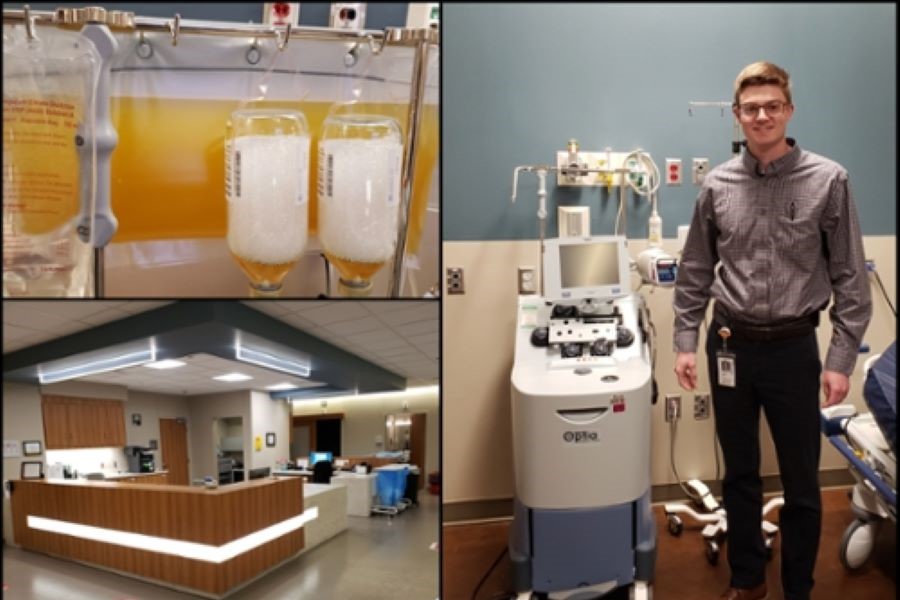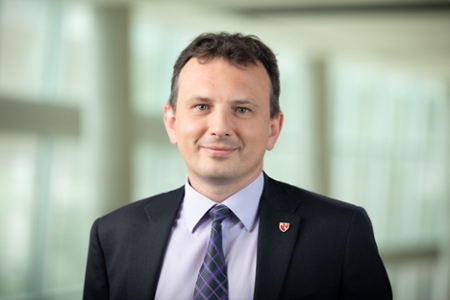- Residency
- Welcome
- Program Details
- Curriculum
- Rotations
- Autopsy
- Bone Marrow
- Clinical Chemistry
- Clinical Microbiology
- Community/Private Practice
- Cytogenetics
- Cytopathology
- Flow Cytometry
- Lymph Nodes
- Molecular
- Neuropathology
- Surgical Pathology
- Transfusion Medicine
- Transplant
- Wet Heme
- Conferences
- Salary & Benefits
- Facilities and Resources
- Residency FAQs
- Teaching and Research Opportunities
- Health Educators and Academic Leaders (HEA
- Residency Events
- Apply
- Current Residents
- Alumni
- Fellowships
- Awards and Accomplishments
- Contact
- Medical Students
- Related Resources
- About UNMC and Omaha
The Transfusion Medicine/Blood Bank rotation at UNMC is so much more than just classic blood banking. We are a transfusion lab that supports a level I trauma center and a state of the art cancer center. In other words, the volumes and complexity of the serological workup are on the very high level with hands on patient care interaction. The residents are actively involved in analyzing serologic workups, writing up transfusion reaction, managing inventory and selection of special blood products for complicated situations (like platelet refractoriness or anaphylactic reaction prevention). The UNMC division of transfusion medicine is also managing apheresis units overseeing therapeutic plasma exchanges, red cell exchanges for sickle cell disease and thalassemia patients and collection of hematopoietic stem cells by apheresis. Residents are being taught the cutting-edge concepts of cellular therapy by participating in the work of the Biologics Production Facility (state of the art cellular therapy lab). The residents are also involved in interpretation of the coagulation tests, which nicely ties into recommendations of appropriate blood products selection for the complex medical situations. Overall, we offer a comprehensive training in all aspects of Transfusion Medicine, Cell Therapy and Coagulation and feel very confident about our trainees being able to handle most of the transfusion medicine questions on their own at the completion of the training.
A Resident's day-to-day on the Transfusion Medicine Rotation

While this rotation is called Blood Bank, it oversees both the Blood Bank here at Nebraska Medicine as well as the Apheresis service!
What a typical day looks like:
7:00AM: Forward the pager. Residents field a variety of calls throughout the day on the Blood Bank/Apheresis pager. Calls can be related to transfusion reactions, questions clinicians have about blood products, consults for apheresis, or questions from the apheresis staff.
7:05AM: Evaluate lab values from overnight and pick up paperwork related to overnight transfusion reactions. You will work on these throughout the day.
7:15AM: Check in with the apheresis staff to see if they need any orders or information from the resident. If there is an early patient, then you can go see them now.
8:00AM-9:00AM: Attend morning didactics through Zoom. Morning didactics are a protected educational time that occurs daily. During this time, you should hand your pager over to your attending so that they can continue to cover your service while you learn.
9:00AM: Go see patients! We have both inpatient and outpatient apheresis procedures.
11:30AM-12:00PM: Attend the daily Interesting Case Conference through Zoom.
12:00PM-1:00PM: Lunch with fellow residents.
1:00PM: Time to see afternoon patients!
2:30PM: Start writing your apheresis procedure notes.
3:00PM-4:00PM: Education. Clinical pathology staff like to use this time to cover an educational topic that was chosen the day prior.
4:00PM: Finish your notes and plan for the next day’s patients.
5:00PM: Transfer the pager over to the on-call resident and go home!

Aleh (Oleg) Bobr, MD
- Residency
- Welcome
- Program Details
- Curriculum
- Rotations
- Autopsy
- Bone Marrow
- Clinical Chemistry
- Clinical Microbiology
- Community/Private Practice
- Cytogenetics
- Cytopathology
- Flow Cytometry
- Lymph Nodes
- Molecular
- Neuropathology
- Surgical Pathology
- Transfusion Medicine
- Transplant
- Wet Heme
- Conferences
- Salary & Benefits
- Facilities and Resources
- Residency FAQs
- Teaching and Research Opportunities
- Health Educators and Academic Leaders (HEA
- Residency Events
- Apply
- Current Residents
- Alumni
- Fellowships
- Awards and Accomplishments
- Contact
- Medical Students
- Related Resources
- About UNMC and Omaha

